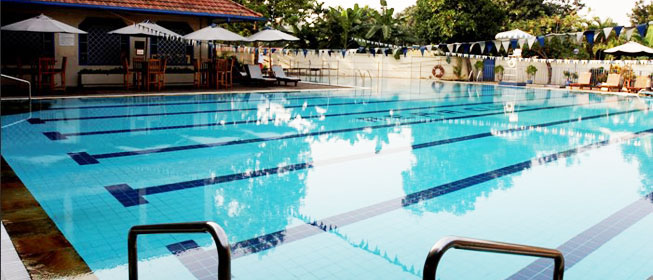Poet Marnie Abrahams describes an incident from her childhood in a Southeast Asian country, where she spent some fun days with her family at “The American Club”:
Pak Ohm taught us to swim, holding our breath
and kicking every Tuesday at four, his own breath
like stale cigarettes. Years later we played shark
in the deep end, diving in, swimming low.
Our parents watched from white plastic chairs
like the ones in country clubs from their
other lives, far away.
We sat in the cool theater eating American pizza,
trying to imagine home — a country we had
never seen. We didn’t know what it meant
when our parents sat gossiping by the pool,
eating hamburgers adorned with imported relish.
We didn’t realize the sanctity of French’s,
spread over processed white bread. Sitting in circles,
they dreamed of convenience stores, shopping malls.
For us the busy, dusty world outside the walls
was as real as the sterile one inside. We came
to the club to drink Oreo shakes on the porch,
sitting on towels in wet swim suits. We went
to gymnastics smelling like chlorine, skin shrinking
in the unfamiliar cool of the air. I did the splits
on the yellow line, perfectly pressing my legs
against the floor, showing off pink leg warmers,
unaware of my insulation.
Outside the walls, old women walked barefoot
over tar-stained roads, carrying fruit baskets
and hungry children. Young men sat smoking,
playing guitars whose music blended with the
loud chaos of traffic. Naked children ran
with paper kites on fishing line, tugging against
the wind, laughing at small miracles.
We hung backwards from the merry-go-round,
blonde hair coloring the wind behind us,
our own little planet spinning like the
friendly white people inside these walls,
a world inside a world, spinning around,
no one wanting off.
Having lived in Indonesia for almost a quarter century, the images in this blank verse strike me as revealing and honest as anything Rudyard Kipling ever wrote. They display an almost colonialist separation between the American ex-patriots behind the walls of their club and the impoverished indigenous people outside.

Robert Sellers
I am profoundly moved by the word pictures in this poem, not only because of the despairing dichotomies they display, but because Marnie Abrahams is our daughter. She wrote this while looking back on how she remembered our visits to Jakarta’s American Club.
Four decades ago now, when we were young parents of preschool-age children, my wife and I were missionaries in the capital city of Indonesia. After having been invited by older missionary friends to go with them to the American Club for a swim and meal, we decided to join the club also. Like our friends, we routinely stayed extremely busy meeting demands and pursuing the opportunities of our work. Just the effort of taking care of our family’s needs in that city of more than 10 million was often exhausting.
With no realistic options for recreation or momentary retreat, we saw club membership as a way to make new friends, enlist our children in classes and activities, go out for a quiet non-rice meal occasionally and be refreshed on a Saturday at the end of a hectic week. We also thought building friendships with ex-patriots as a missionary family would be a valid extension of our ministry.
Certainly, our young daughter did not know our reasons for joining or participating in the activities at this club. But as a college student in a creative writing class, especially drawing upon her keenly developing ethical sensitivities, she wrote what she remembered of the experience.
By doing that, she provides some instructive, helpful insights which I try to interpret and feel I must highlight.
“Beyond the walls, Indonesian children ran barefoot along the asphalt road, hot and steamy under the tropical noonday sun, pulling their paper kites behind them.”
Oil company personnel and corporate staff on overseas assignment did sit poolside chatting, where they enjoyed expensive portions of the very fruit available from the woven bamboo baskets of the fruit saleswomen not 200 meters away. Children, mostly white and privileged, took swim lessons or joined gymnastics classes — while beyond the walls, Indonesian children ran barefoot along the asphalt road, hot and steamy under the tropical noonday sun, pulling their paper kites behind them.
The ex-patriots inside the walls likely didn’t reflect upon the segregation the space assured. They were aware of it, of course, because spending time with others “like them” and enjoying amenities from “back home” were certainly part of their interest in joining the American Club. Yet, the stark dichotomy, the radical cultural shift, was likely overlooked as their hired drivers steered them past the guards at the gate and delivered them into the hallowed sanctuary of imported hamburger condiments and freshly churned ice cream. Within those walls there were Hollywood movies, exercise and yoga classes, tennis tournaments on lighted courts, familiar comfort food and Thanksgiving or Halloween celebrations — a “world within a world.”
Perhaps some who arrived at the gate displayed a hint of boredom or impatience, even entitlement, on their faces or in their voices as they stopped to produce membership ID cards to prove they belonged inside. The club was a small oasis of privilege and familiarity surrounded by masses of the local poor, who at times seemed as numerous as the sands of the equatorial beach beyond the city, where ex-pat families liked to rent villas for vacations. Like the children swinging on the playground equipment, a lot of these Americans did whirl around, sadly “unaware of their insulation” from the rest of life.
“It was simply too comfortable not to see the discrepancies.”
And, as Marnie so poignantly and pointedly describes, these undeniably insulated, comparatively wealthy, mostly white and totally privileged club members perhaps did not really want to get off the spinning merry-go-round that was their life in a “foreign” country. It was simply too comfortable not to see the discrepancies.
The poem makes me wonder how many of us living here in America maintain a comfortable distance from other Americans who aren’t in our protected spaces — our neighborhoods, universities and alumni groups, country clubs and social relationships, even our churches. Are we so involved with the shopping sprees, lunches with friends, athletic events, concerts and theater productions, home improvements and vacation trips that we do not notice the way so many people around us are forced to exist? Is our insulation from “those people” so familiar an experience that it’s like we are on “our own little planet”?
But as I reflect upon the American Club from this vantage point, particularly in light of this poem, there were other reasons why I could have questioned our membership. The club provided a segregation from those who were racially different. It was a closed, exclusive space for American passport holders, and thus not open to any indigenous neighbors. In the restaurant or poolside, members could order bacon, ham sandwiches, barbecue and chops, prepared and served by Muslim staff members despite their religious aversion to pork.
“The club suggested to hundreds of impressionable children that Indonesians served and Americans were served.”
Moreover, in subtle ways, the club suggested to hundreds of impressionable children that Indonesians served and Americans were served. In that way, although nicer, this space was like a private club in the American South during Jim Crow, where Blacks could work as waiters or gardeners but never join as members.
Should I have wondered about our family’s time spent at the American Club? Did our going there risk teaching our children that exclusionary memberships and socio-economic or racial separation was OK? Was our chance to make friends with ex-pats, many of whom seemed lonely and disconnected, an adequate justification for our being there? Were we also on that merry-go-round, held there by some centrifugal force not of our own making, spinning around, but oddly not wanting off? Perhaps subconsciously, we were.
It’s too late to return to Jakarta and rethink our joining the American Club. But some lessons about that experience have been brought sharply into focus for me by this poetic memory of our daughter. I cannot get out of my mind the image of poor fruit vendors at the open market where we bought our food, or teenagers at our Indonesian church leading worship with their inexpensive guitars, or children on windy days running gleefully along the streets pulling paper kites. These memories, reawakened by this poem, must influence the choices I make and the engagements I initiate and nurture with the people around me.
Moreover, I want to suggest that many of us might examine ourselves to see if we are truly insulated from those outside our walls. Perhaps we are so caught up in the whirling busyness of our daily demands and activities that the days are simply a blur. We may be living comfortably yet are spinning around in place, hanging backward from our isolated and protected world within a world.
Rob Sellers is professor of theology and missions emeritus at Hardin-Simmons University’s Logsdon Seminary in Abilene, Texas. He is a past chair of the board of the Parliament of the World’s Religions in Chicago. He and his wife, Janie, served a quarter century as missionary teachers in Indonesia. They have two children and five grandchildren.
Related articles:
Four feet, two skates | Opinion by Bob Newell
I’ve been unaware of my privilege, and if you are a man, you probably have, too | Opinion by Robert Sellers
How will you use your privilege? | Opinion by Mark Wingfield

